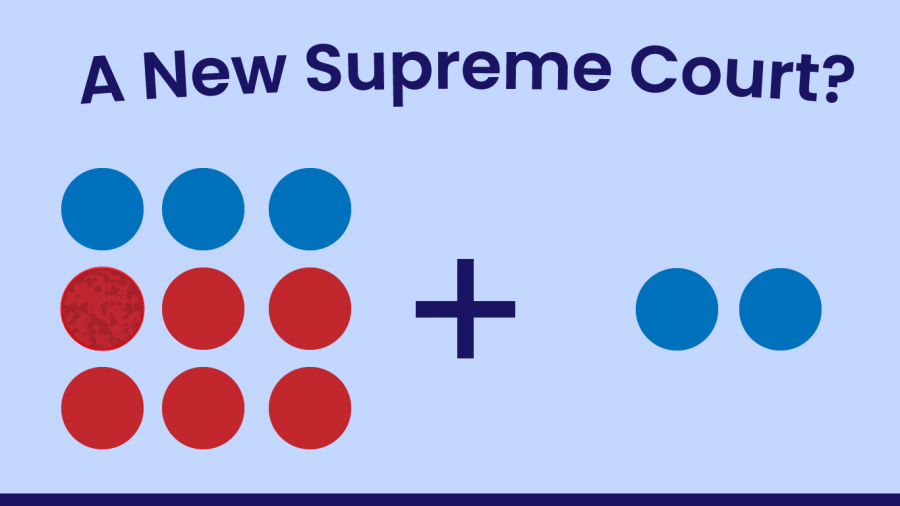What She Left Behind
Ruth Bader Ginsburg’s legacy and the future of the Supreme Court
Some Democrats are arguing that the only viable response to a Republican nomination is to add new seats to the Supreme Court.
On Friday, Sept. 18, 2020, Supreme Court Justice Ruth Bader Ginsburg died due to complications from pancreatic cancer. Her death leaves behind a powerful legacy, but also has big implications for the future of the Supreme Court.
Ruth Bader Ginsburg’s tendency to dissent from popular viewpoints within the court and her battle for gender equality made her one of the most influential figures in contemporary politics. Her dissenting attitude earned her the nickname “The Notorious R.B.G.” among fans, a name adapted from the late rapper “The Notorious B.I.G.” Even before her appointment to the Supreme Court, Ginsburg led the Women’s Rights Project in the American Civil Liberties Union. During that time, she argued six important cases to the Supreme Court.
In 1980, President Carter appointed Ginsburg to the U.S. Court of Appeals for the District of Columbia. She served on that court for 13 years until President Clinton appointed her to the Supreme Court in 1993. Although Ginsburg is generally regarded as an important progressive figure during her time on the Supreme Court, her actions certainly weren’t radical. Ginsburg favored a reserved approach to action on the court, rather than attempting to rapidly change an overarching problem.
Although her affirmative actions on the Supreme Court were powerful, some would argue that her dissent from court decisions has been even more influential. Ginsburg famously dissented from the opinion of the court on the case of Bush v. Gore. Her comments on dissent were especially powerful because of her tendency towards restraint.
With her death last Saturday, the new opening leaves serious implications for the future of the Supreme Court. Currently, Republicans control the Senate, which essentially means that they control the process by which a new justice will be appointed.
Ginsburg reportedly dictated to her granddaughter a few days before her death that “my most fervent wish is that I will not be replaced until a new president is installed.”
It is important to note that when Justice Antonin Scalia passed away in February 2016, Senate Republicans blocked President Obama’s nomination, stating that the voters should decide the new president before a justice was appointed.
Now, just over a month before election day, Mitch McConnell has stated that the Senate will vote on whatever justice is nominated by President Trump. Trump announced on Monday that he will announce his choice for the nomination this Friday. Although Republicans are leading the Senate by a slim majority, it is still likely that they will succeed in voting to appoint whatever justice is nominated by Trump. If the process is successful, Republicans will have achieved a 6-3 super-majority in the Supreme Court.
The implications of a possible super-majority are quite grim for the Democratic party. Some of President Trump’s top choices for the nomination are quite young, such as Amy Coney Barett, who is only 48. A justice appointed at this age could potentially serve on the court for multiple decades.
The current situation with the Supreme Court has prompted some Democrats to argue for an addition of seats to the Supreme Court. If, after the election in November, Democrats controlled the Senate and Biden had won the presidency, it would still be a radical move to add two seats to the Supreme Court. However, many Democrats argue that this would be the only way to balance the court in favor of the party.
Ruth Bader Ginsburg’s death is arguably the most important political development preceding the upcoming election. With Biden consistently leading Trump in polls over the last few months, it will be interesting to see how this change will develop voter opinions as we approach the election.
What are your opinions on the upcoming Supreme Court nomination? Do you think that the Senate should wait until the election before appointing a new justice?

Keegan Jack is a senior at Boulder High School with, among other things, a passion for the combination of media and information. It was this very passion that inspired him to pursue working for The Owl. He loves exploring the wonderful nature of Colorado and trying to capture its beauty through the art of photography. He also enjoys various other hobbies, such as illustration, playing cello, and boxing. Keegan prides himself on being an effective communicator, but this sometimes means he ends up trying to convince people about things that they don’t want to change their mind about, such as his belief in the ambiguity between the types of grapes. Although the COVID-19 virus has certainly been...






